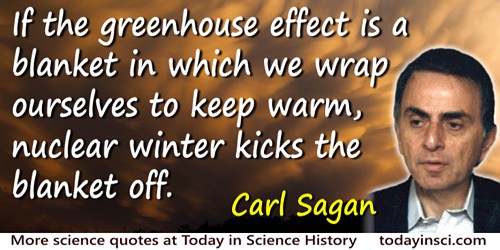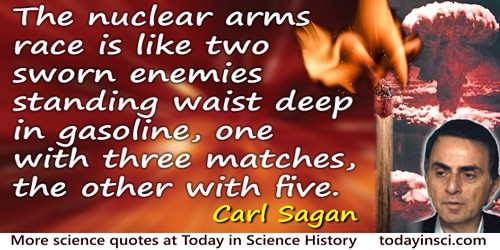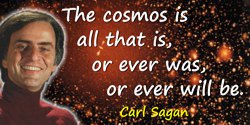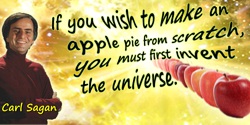 (source)
(source)
|
Carl Sagan
(9 Nov 1934 - 20 Dec 1996)
American astronomer, exobiologist and writer remembered for popularizing astronomy and science, especially with his public television series Cosmos. Its accompanying book spent seventy weeks on The New York Times bestseller list. He was an adviser to NASA for the Mariner, Voyager, and Viking unmanned space missions.
|
Carl Sagan Quotes on Nuclear (4 quotes)
>> Click for 119 Science Quotes by Carl Sagan
>> Click for Carl Sagan Quotes on | Argument | Contradiction | Cosmos | Experiment | Hypothesis | Idea | Knowledge | Life | Religion | Science | Science And Religion | Scientist | Sense | Skepticism | Star | Sun | Test | Thinking | Truth | Universe |
>> Click for 119 Science Quotes by Carl Sagan
>> Click for Carl Sagan Quotes on | Argument | Contradiction | Cosmos | Experiment | Hypothesis | Idea | Knowledge | Life | Religion | Science | Science And Religion | Scientist | Sense | Skepticism | Star | Sun | Test | Thinking | Truth | Universe |
If the greenhouse effect is a blanket in which we wrap ourselves to keep warm, nuclear winter kicks the blanket off.
[co-author with American atmospheric chemist Richard P. Turco (1943- )]
[co-author with American atmospheric chemist Richard P. Turco (1943- )]
— Carl Sagan
A Path Where No Man Thought: Nuclear Winter and the End of the Arms Race (1990), 24.
Imagine a room awash in gasoline, and there are two implacable enemies in that room. One of them has nine thousand matches. The other has seven thousand matches. Each of them is concerned about who's ahead, who's stronger. Well that's the kind of situation we are actually in. The amount of weapons that are available to the United States and the Soviet Union are so bloated, so grossly in excess of what's needed to dissuade the other, that if it weren't so tragic, it would be laughable. What is necessary is to reduce the matches and to clean up the gasoline.
— Carl Sagan
From Sagan's analogy about the nuclear arms race and the need for disarmament, during a panel discussion in ABC News Viewpoint following the TV movie The Day After (20 Nov 1983). Transcribed by Webmaster from a video recording. It is seen misquoted in summary form as “The nuclear arms race is like two sworn enemies standing waist deep in gasoline, one with three matches, the other with five.”
The nuclear arms race is like two sworn enemies standing waist deep in gasoline, one with three matches, the other with five.
[A summary version; not verbatim.]
[A summary version; not verbatim.]
— Carl Sagan
A summary version, as written by Kristen Ghodsee in Lost in Transition: Ethnographies of Everyday Life After Communism (2011), 2-3. Note the author states it as “I remember,” and the wording is not verbatim from Sagan's original remark made during a panel discussion in ABC News Viewpoint following the TV movie The Day After (20 Nov 1983). The verbatim quote is also on this page. It begins, “Imagine a room…”
The prediction of nuclear winter is drawn not, of course, from any direct experience with the consequences of global nuclear war, but rather from an investigation of the governing physics. (The problem does not lend itself to full experimental verification—at least not more than once.)[co-author with American atmospheric chemist Richard P. Turco (1943- )]
— Carl Sagan
A Path Where No Man Thought: Nuclear Winter and the End of the Arms Race (1990), 26.
See also:
- 9 Nov - short biography, births, deaths and events on date of Sagan's birth.
- Carl Sagan - context of quote “Advances in medicine and agriculture” - Medium image (500 x 250 px)
- Carl Sagan - context of quote “Advances in medicine and agriculture” - Large image (800 x 400 px)
- Carl Sagan - context of quote A Subject Called Chemistry - Medium image (500 x 350 px)
- Carl Sagan - context of quote A Subject Called Chemistry - Large image (800 x 600 px)
- Carl Sagan: A Life in the Cosmos, by William Poundstone. - book suggestion.
- Booklist for Carl Sagan.




![Carl Sagan quote: [Science] is not perfect. It can be misused. It is only a tool. But it is by far the best tool we have, self-c](https://todayinsci.com/S/Sagan_Carl/SaganCarl-MisusedThm.jpg)



